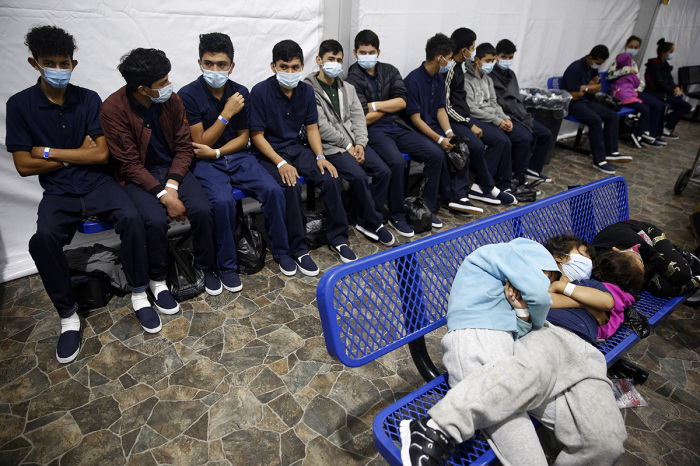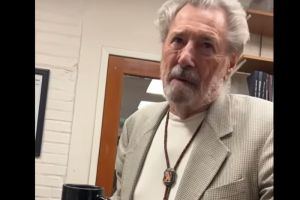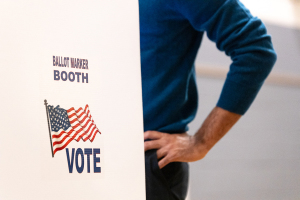Migrant children struggle with depression, suicide amid horrid conditions at Texas shelter
Overcrowded migrant border facilities for children raise alarm

Lice outbreaks, unsanitary living conditions, suicide attempts and reports of rape are emerging from the tent camps housing thousands of migrant children at the U.S. southern border, where the children are held before being bussed or flown to cities in Texas and other states.
As the border crisis continues to escalate, reports reveal what it's like for many children living in overcrowded holding facilities and tent camps who suffering in living conditions described as “terrible.”
The U.S. Department of Health and Human Services set up a system of over a dozen emergency camps to temporarily house unaccompanied minors at the beginning of the year.
Unaccompanied minors came to the southern border in record numbers after the Biden administration reversed many strict Trump-era immigration policies early in his term, including rescinding a national emergency proclamation.
Border agents have for years complained of being understaffed and under-resourced. Nearly 15,000 unaccompanied minors are said to be housed in U.S. government-run facilities.
Many migrant children at the Fort Bliss Army Base in El Paso, Texas, which once housed thousands of children before many of them departed in recent days, were depressed and discouraged.
Some children in Fort Bliss’ large tent complex required one-on-one supervision to ensure they did not harm themselves or commit suicide.
Last week, attorneys filed complaints on behalf of over a dozen minors who detailed the conditions they faced, with one girl saying she spent over 60 days in the facility.
A released court document details the account of a 13-year-old girl from Honduras who had been at the Fort Bliss Emergency Intake Site in El Paso for a few months. She described her time on the “1:1” suicide watch list, where a staffer is required to supervise the suicidal minor at all times.
At the time of her account, eight people were on the suicide watch list, but the number was once as high as 28 individuals, she said.
Since pencils, pens, scissors, nail clippers and regular toothbrushes have been banned inside tent housing due to fears of self-harm, some have resorted to using their identification cards to cut themselves.
She shared how she virtually ate only juice and popsicles due to the food smelling foul she described as “horrible.”
Staff members have reported multiple cases of self-harm, according to interviewees who spoke with BBC.
"I thought that I was not going to get out of there, that I was not going to see my family again," a 15-year-old told BBC.
"Sometimes, and at night, we would cry. During the worst time, I was nearly at the point of committing suicide," he said.
One migrant minor reported having trouble setting up appointments with counselors for her depression. She told Reuters that a lot of minors "end up having to talk to someone because they have thoughts of cutting themselves."
A teenage girl from Honduras complains there is no one to help her with her case.
"There is no one here I can talk to about my case," said a 17-year-old Honduran detainee, according to Reuters. "There's also no one here I can talk to when I'm feeling sad. There's no one here; I just talk to God. It helps me, and I cry. It would help if I could have a Bible."
Another story shared by the Associated Press was of a 16-year-old boy who had to wait more than three weeks to see if he could live with his sister in New Orleans.
“I am desperate,” he shared with AP. “I wouldn’t mind being here for 20 or 30 days if I knew that I was going to be released soon. But because the process hasn’t started and because I had no idea what’s happening or when the process will start, that makes me feel very, very anxious. I don’t know when this will end.”
Fort Bliss is an unlicensed shelter that has been repeatedly singled out in reports for its “allegedly filthy conditions” and lack of staff, The Dallas Morning News reports.
Reports have even surfaced about children suffering sexual abuse from staff members at the Fort Bliss camp.
"We have already caught staff with minors inappropriately," an employee said at a camp training session secretly recorded by a staff member and shared with the BBC.
Another employee said the Department of Homeland Security had discussed rape with the staff members.
"DHS mentioned there was a rape — they are giving the girls pregnancy tests," an employee told BBC. "And I heard the other night that another contractor was caught in a boys' tent, you know, doing things with him."
HHS did not respond to BBC about the specific allegations uncovered at Fort Bliss. However, the agency released a statement saying that it is "providing required standards of care for children such as clean and comfortable sleeping quarters, meals, toiletries, laundry, educational and recreational activities, and access to medical services."
Carlos Holguín, a lead attorney representing migrant children in a federal case, saw distressed children “close to their breaking point” when he visited the Fort Bliss facility earlier this month. He compared it to "industrial-scale detention.”
"I saw that in the faces of virtually every kid I interviewed at Fort Bliss: A sense of despair and isolation," Holguín told CBS News.
"It cannot be healthy for children who have left endemic violence in the Northern Triangle of Central America, endured the gauntlet that they had run to get here from Mexico and then to wind up in a facility that is so large and impersonal as Fort Bliss," Holguín continued.
After visiting the Fort Bliss holding facility, attorney Leecia Welch of the National Center for Youth Law said the government should seek alternatives to the border facilities and focus on more permanent solutions.
"The government makes a poor parent to begin with — and Fort Bliss exemplifies this beyond measure," Welch told CBS News.
Journalists have not been allowed inside this makeshift facility made to assist overcrowded Border Patrol facilities.
HHS Secretary Xavier Becerra visited the Fort Bliss shelter on Monday. He praised the improved processing that had fallen from 4,000 children in May to now under 790 boys. He said all the girls were reunited either with relatives in the U.S. sent to a sponsor family or sent to licensed facilities that have a higher standard of care.
However, he did not address the specific requests about the inhuman conditions of the facility, Dallas Morning News reported.
In a trip to Guatemala and Mexico last month to address the “root causes” of immigration, Vice President Kamala Harris told migrants, “do not come, do not come” to the border.
Harris toured the Texas border in El Paso for the first time last week since being tapped as the administration’s “border czar” in March.
Harris faced heavy criticism for visiting the border in El Paso, which is nearly 800 miles from the epicenter of the crisis in the Rio Grande Valley. Critics claimed her border visit was nothing more than a “check-the-box” trip.
As the border surge continues and children remain in rough living conditions at overwhelmed border facilities, the Biden administration faces backlash from both sides of the political aisle that it is not rising to adequately address the crisis and overrun facilities.
The Biden-Harris campaign promised a “fair and humane immigration system." It campaigned on the commitment to improve the humanitarian situation at the southern border.
Texas Gov. Greg Abbott has announced plans to invest at least $250 million in border wall construction after the Biden administration halted construction on the Trump administration's border wall.
Trump visited the "decimated southern border" with Abbott this week to discuss the surge in illegal immigration, decreased national security and the need to complete the southern border on Wednesday.
Emily Wood is a reporter for The Christian Post. She can be reached at: emily.wood@christianpost.com




























